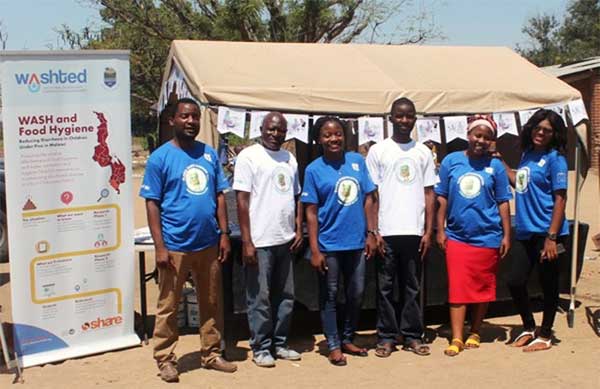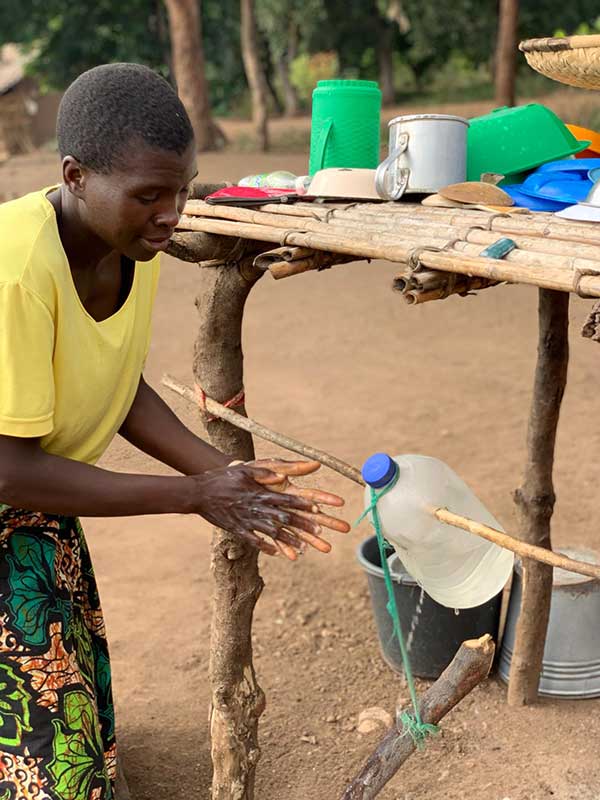A combined WASH and complimentary food hygiene intervention to reduce diarrheal disease in rural Malawi
Investigators
- Principle investigator: Tracy Morse, University of Strathclyde, Department of Civil and Environmental Engineering, Glasgow, UK.
- Coinvestigator: Kondwani Chidziwisano, University of Malawi, The Polytechnic (Department of Environmental Health and WASHTED Centre, Blantyre, Malawi)
- Coinvestigator: Elizabeth Tilley, EAWAG: Swiss Federal Institute of Aquatic Science and Technology, 8600 Dübendorf, Switzerland
Other collaborators & partners
- Janelisa Musaya, Department of Pathology, University of Malawi, College of Medicine, Blantyre, Malawi
- Ministry of Health, Malawi Government
- Ministry of Irrigation and Water Development, Malawi Government

Background
62% of diarrhoeal deaths in children under the age of five years in low and middle-income countries have been associated with poor water quality, sanitation and hygiene, including the consumption of contaminated food at household level.
Childhood diarrhoea has been associated with stunting, which leads to poor cognitive development in children. In Malawi, high rates of chronic malnutrition have led to 37% of young children being stunted. Malawi has a diarrhoea disease prevalence of 22% among children under the age of five. Interventions that aim to reduce child exposure to faeces have traditionally focused on infrastructure, (e.g. toilets). However, there is growing evidence contaminated foods also have an important role to play, with 40% of the foodborne disease burden falling on children under the age of five.
Malawi has a diarrhoea disease prevalence of 22% among children under the age of five.
There has been little integration of food hygiene in traditional WASH or nutrition programmes despite its important place in potentially reducing diarrhoea. To assess this route for controlling diarrhoea, the Hygienic Family study was conducted in rural Malawi by the WASHTED centre, at the Malawi Polytechnic in collaboration with the University of Strathclyde. This behaviour-centred, context-appropriate intervention integrated improved food hygiene and WASH practices, addressing both infrastructure and behaviour to achieve reductions in childhood diarrhoea.
Beneficiaries
Primary beneficiaries of the study were children aged five years and below, and child caregivers (mostly women) of children aged five years and below in rural households of Malawi.
The community health workers (government extension workers) and community volunteers at the grassroots level also benefited, as they gained knowledge and skills related to WASH and food hygiene promotion.
The government at a national level and non–governmental organisations (NGOs) have also benefited from the study since it has provided recommendations and practical tools on how these key stakeholders can effectively promote WASH and food hygiene behaviours in the rural areas.
Sustainable development goals
This project targeted two of the Sustainable Development Goals (SDGs):
- Goal 3: Good Health and Wellbeing
- Goal 6: Clean Water and Sanitation
This project also targeted Goal 5 (Gender Equality), as it empowered women to be actively involved in making decisions about sanitation and hygiene at household level.
Indirectly, the project focused on addressing Goal 2 (Zero Hunger) since good health would enable the community members to maximize production in their agricultural fields, hence reducing hunger; and this would have an impact on Goal 1 (No Poverty).
Impact
The research itself resulted in several achievements which include:
- reduction in childhood diarrhoea
- improved WASH and food hygiene behaviours
- improved social capital among the community members
Tools from the intervention have also been adopted by international NGOs in Malawi for WASH-based programmes, and the need for effective behaviour centred approaches to community development has now been embedded in the National Sanitation and Hygiene Strategy.
Publications
- Developing a Contextually Appropriate Integrated Hygiene Intervention to Achieve Sustained Reductions in Diarrheal Diseases, Morse et al. (2019)
- Risk Factors Associated with Feeding Children under 2 Years in Rural Malawi—A Formative Study, Chidziwisano et al. (2019)
- Toward Complementary Food Hygiene Practices among Child Caregivers in Rural Malawi, Chidziwisano et al. (2019)
- Health Outcomes of an Integrated Behaviour-Centred Water, Sanitation, Hygiene and Food Safety Intervention–A Randomised before and after Trial, Morse et al. (2020)
- Improving Complementary Food Hygiene Behaviors Using the Risk, Attitude, Norms, Ability, and Self-Regulation Approach in Rural Malawi, Chidziwisano et al. (2020)
- Self-Reported Versus Observed Measures: Validation of Child Caregiver Food Hygiene Practices in Rural Malawi, Chidziwisano et al. (2020)
Challenges & lessons learned
Given the significant role that food plays in the transmission of diarrhoeal diseases and under-nutrition in low and middle-income countries (LMICs), food hygiene behaviour change approaches should be incorporated in existing related policies and strategies.
Programme implementers should identify and integrate behaviour change techniques that effectively altered significant behaviours in existing community nutrition and WASH programmes (e.g. Community-Led Total Sanitation (CLTS) and Scaling Up Nutrition (SUN)). This study provides insights on appropriate actions required to address barriers related to food hygiene practices in this setting.
More effort is needed to evaluate and assess the sustainability of WASH, food hygiene and behaviour change interventions over longer periods.
Community-based implementation methods for interventions should consider the added value of non-WASH and hygiene benefits such as improved social relationships, empowerment, and community social capital, which can benefit other developmental activities.
